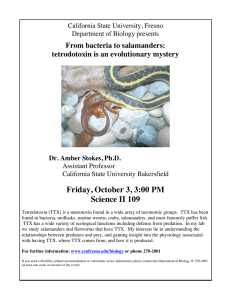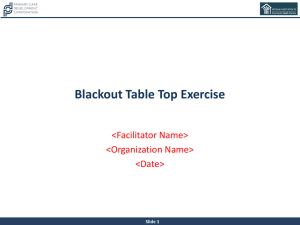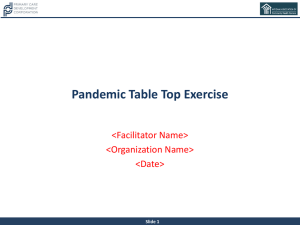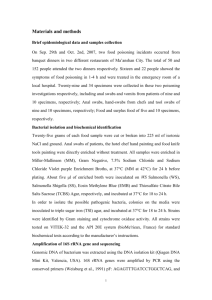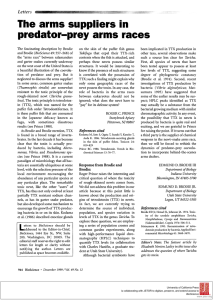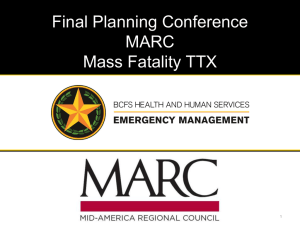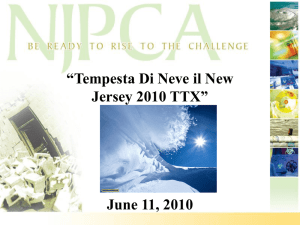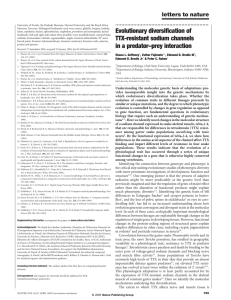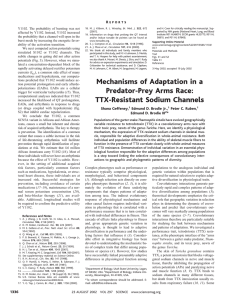Severe Weather Table Top Exercise Presentation
advertisement
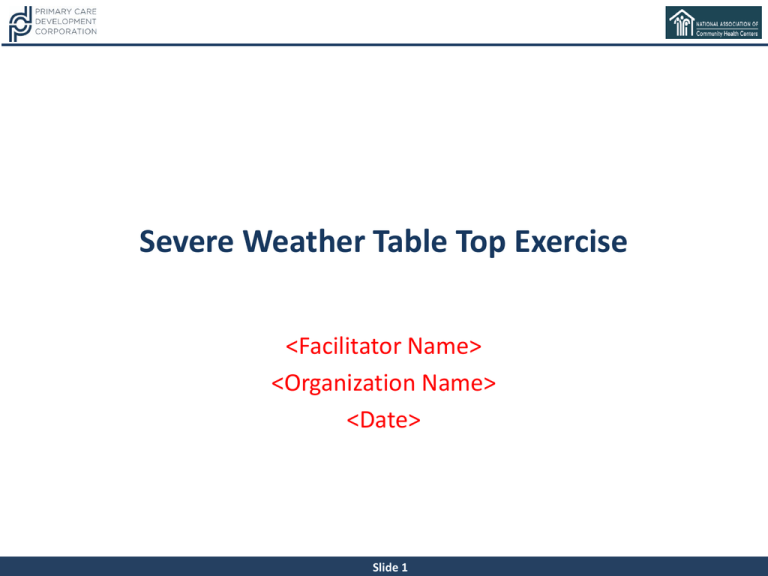
Severe Weather Table Top Exercise <Facilitator Name> <Organization Name> <Date> Slide 1 About This Tool • This tool is the result of a collaboration between the Primary Care Development Corporation (PCDC) and the National Association of Community Health Centers (NACHC). • It is intended to provide primary care centers, including community health centers, an easy to use tool to test and improve their business continuity plans. • For assistance, questions or more information on this and other business continuity and emergency preparedness tools and resources, please contact PCDC (www.pcdc.org or 212-437-3900) or NACHC (www.nachc.org or xxx-xxx-xxxx) Slide 2 Today’s Agenda • Review information about table top exercises • Table Top Exercise – Scenario injects – Group decision and discussion • Facilitator directed questions • Hotwash • Next Steps – After Action Report (AAR) – Corrective Action Plan (CAP) Slide 3 What is a Table Top Exercise (TTX) • A Tabletop Exercise, also known as a TTX, is one type of exercise held in an informal setting intended to generate discussion of various issues regarding a hypothetical, simulated emergency incident. • TTXs can be used to: – Enhance general awareness – Validate plans and procedures – Assess the types of systems needed to guide prevention of, protection from, response to, and recovery from a defined incident. • Goal of TTXs are include – Facilitating concept understanding – Identifying strengths & weaknesses – Achieving changes in attitudes. Slide 4 Types of Exercises Slide 5 Why do a TTX? • Testing the plan, not the people • Key organizational personnel discuss simulated scenarios in an informal setting • Assist in the promotion of understanding related concepts • Used to assess plans, policies, procedures or the systems employed by the organization – Highlight strengths and areas for improvement within current plans, policies and procedures Slide 6 Exercise Roles • Facilitator – Facilitates the exercise • Participants (Players) – Key Staff & Decision Makers – External Agencies – Elected / Appointed Officials • Evaluators – Observe behavior in relation to plans & procedures – Record Information without leading Players – Report observations • Observers – Observe exercise; No interaction in exercise play Slide 7 Hotwash, After Action Report (AAR), & Corrective Action Plan (CAP) • Hotwash – A debrief with the exercise planning team, controllers & evaluators held immediately following the exercise. – Allows controllers and evaluators to collect observations and thoughts about the conduct of the exercise which leads to the development of preliminary analyses of exercise observations. • After Action Report (AAR) – Chronological narrative of discussion for each capability & associated activities – Highlight both strengths and areas for improvement – Identify discussion points relevant to your site’s ability to carry out the activities – Demonstrate the capabilities being exercised • Corrective Action Plan (CAP) – Corrective actions are the concrete, actionable steps outlined in improvement plans that are intended to resolve preparedness gaps and shortcomings experienced in exercises or real-world incidents. Slide 8 TTX Objectives & Capabilities • For the purposes of this Table Top, our site is focused on testing the following capabilities: • Describe 1-3 • • capabilities of your BCP that you are testing for this TTX. Capabilities can include certain business processes, BIA’s, or disruptive action policies Be sure to delete this box prior to the TTX • The objectives of today’s Table Top are: • • • Slide 9 Describe 1-3 SMART goals for the exercise. SMART stands for Specific, Measurable, Achievable, Realistic and Timely Be sure to delete this box prior to the TTX TTX Intent • This tabletop exercise was specifically developed to identify gaps in business continuity plans • The intent of this TTX will be to specifically target the discussion of business continuity operations and response to an emergency event. • Processes, discussion and decision-making are more important than minute details. Slide 10 BCP Topics to Consider During TTX • BIA Report • HVA Report • Incident Management Plan • Communications Plan – Emergency Notification Plan – Risk Communications Policy • Procedures – Disruption Actions – Individual Business Impact Analysis Forms • Appendices – – – Memorandums of Understanding (MOUs) Key Contacts, Vendors & Suppliers Other Important Documents Slide 11 TTX Play • Table Top Exercise – Scenario injects – Group discussion and decision • Facilitator directed questions • Hotwash • Next Steps – After Action Report (AAR) – Corrective Action Plan (CAP) Slide 12 Remember… • Accept the artificialities of the scenario – “Fight the problem not the scenario” • Remember you are testing the plan, not the people – There are no right or wrong answers • Consider your current plan, facility, capacity & capabilities • There will be time for group problem-solving, discussion and decision-making • Even though a TTX is a “discussion-based” exercise, you will need to make actual decisions at the end of each discussion • Makes notes on your response • Please direct all questions to the facilitator/controller Slide 13 TTX Scenario • Day 1 • Tuesday in April • One hour before facility closing • The weather is cool and overcast • The site is experiencing a normal to high patient volume • The site is running with 100% of staff. All systems are running smoothly Slide 14 TTX: Module 1 • The receptionist comes to the site director informing them that his Weather Channel iPhone application mentioned something about possible severe weather. • Upon further investigation, the National Weather Service has issued a severe storm warning overnight with possible thunderstorms and localized flooding. • DISCUSS & DECIDE (5 minutes) • Discuss how you would response based on the above injects • Make decisions based on current plans and capabilities Slide 15 TTX: Module 2 • Day 2 • Wednesday at 7:30 am • The site director receives a phone call from the site manager stating that the health center has 2-3 feet of water in it, presumably due to the storms last night. • Additionally, a large tree has fallen over in the parking lot and is partially blocking access to the front entrance. The tree has also knocked down a power line and there is no power in the facility. • The city has closed all schools in the area due to damage and until each site can be inspected for safety. • DISCUSS & DECIDE (5 minutes) • Discuss how you would response based on the above injects • Make decisions based on current plans and capabilities Photo Credit: http://aspergillusblog.blogspot.com/2008/06/mould-and-flooded-homes.html Slide 16 TTX: Module 3 • Day 2 • Wednesday at 11:15 am • The electric company has been able to restore power to the building, however the tree will not be able to be removed until the next day at the earliest. • Scheduled patients continue to show up at the office for appointments • All other hospitals and health centers in a ten-mile radius report overwhelming patient surges or being closed due to damage. • DISCUSS & DECIDE (5 minutes) • Discuss how you would response based on the above injects • Make decisions based on current plans and capabilities Photo Credit: http://singaporeseen.stomp.com.sg/stomp/3552/4126/287756 Slide 17 TTX: Module 4 • Day 2 • Wednesday at 3:00 pm • The National Weather Services advises local agencies that a similar storm is expected to move through the area overnight. • DISCUSS & DECIDE (5 minutes) • Discuss how you would response based on the above injects • Make decisions based on current plans and capabilities Photo Credit: http://thepeoplescube.com/peoples-competition/caption-a-perfect-storm-t3041.html Slide 18 TTX: Module 5 • Day 2 • Thursday at 8:00 am • The expected storm did not hit the area as expected and the National Weather Service predicts good weather for the next 7-10 days • The city was able to remove the tree from the parking overnight and all the water has receded or been removed from the facility • DISCUSS & DECIDE (5 minutes) • Discuss how you would response based on the above injects • Make decisions based on current plans and capabilities Photo Credit: http://voices.washingtonpost.com/capitalweathergang/2009/07/forecast_summer_shine.html Slide 19 Activity: Hotwash • What did you learn from the TTX today about your site and your BCP? – What areas of your BCP are well developed? – What areas of you BCP need improvement? – What are your next steps? Slide 20 Next Steps • The site will use the information gathered from the hotwash discussion to complete a draft version of the After Action Report (AAR), including a Corrective Action Plan (CAP). • The draft version will be circulated to site staff for feedback. The feedback will be incorporated into a final draft of the AAR & CAP. • Staff will meet for an After Action Conference (AAC) where the final draft will be approved and plans to implement the CAP will be adopted. Slide 21 QUESTIONS? Slide 22 <Site Logo> Contact: <Your Name> <Phone Number> <E-Mail> <Site Web Address> Slide 23
